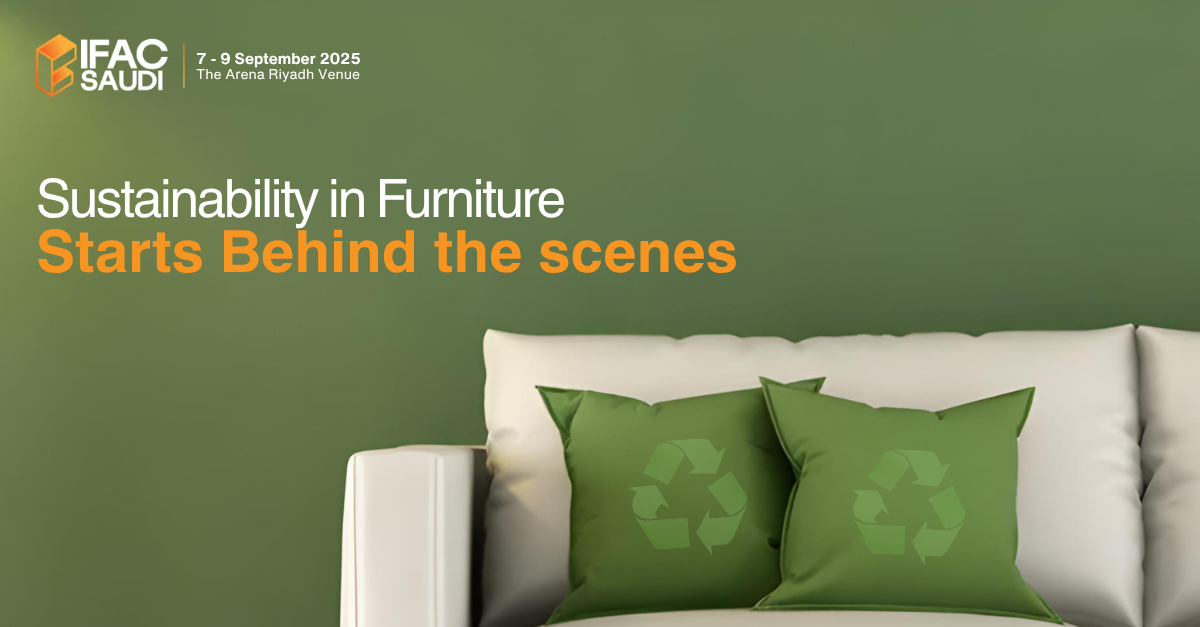
Rethinking Sustainability in Furniture Components: Is the MENA Region Ready?
04 August 2025
Prepared By IFAC Team
The global push for sustainability is no longer limited to high-profile architecture or end-product design. Increasingly, furniture components — the invisible systems that hold our interiors together — are coming under scrutiny.
From the adhesives used in panels to the lifecycle of fittings and modular systems, every element matters. And in regions like the Middle East and North Africa (MENA), where construction and interior development are booming, the need for a more sustainable supply chain has become urgent.
What Does “Sustainable” Really Mean in Furniture Components?
While “green” is a word often used loosely, sustainability in this context touches on:
• Material origins — Are raw materials sourced responsibly?
• Manufacturing processes — Are energy, emissions, and water usage optimized?
• Product lifespan — Are components built to last or easily repaired/ recycled?
• Logistics — Can supply chains be localized to reduce carbon footprints?
Where Does the MENA Region Stand?
In markets like the UAE, Saudi Arabia, and Egypt, sustainable construction codes and certification schemes (like LEED or Estidama) are gaining momentum. However, the furniture and interiors supply chain is still catching up — especially in:
• Local sourcing of certified wood panels and substrates
• Availability of eco-friendly surface finishes
• Transparency in material labeling and documentation
• Modular, low-waste design approaches
That said, there’s been a notable rise in material innovation, supplier awareness, and client demand over the last five years — especially among fit-out firms and project developers looking to meet environmental benchmarks.
Where the Opportunities Lie
The current landscape in MENA presents both a challenge and an opening
| Challenge | Opportunity |
| Heavy reliance on imported materials | Invest in local certified production |
| Limited access to low VOC adhesives / finishes | Open the Market for green chemistry |
| Lack of documentation and traceability | Drive adoption of product passports |
| One-size-fits-all components | Expand the modular, customizable systems |
For both suppliers and buyers, being part of the solution is no longer about marketing — it’s about resilience, responsibility, and future-proofing your business.
The Role of Industry Platforms
While there’s no single solution, industry gatherings play a crucial role in shaping this transition.
Events that bring together component manufacturers, designers, material scientists, and sustainability advocates offer space to:
• Compare new technologies
• Learn from case studies
• Explore sourcing alternatives
• Shift from awareness to implementation
An industry platform where these conversations are quietly taking shape is IFAC – the International Furniture Accessories & Components Show.
As a specialized B2B exhibition focused on materials, fittings, and semi-finished products for furniture and interiors, IFAC serves as a regional meeting point for manufacturers, designers, and sourcing professionals.
While sustainability is not its central theme, the show increasingly reflects the evolving concerns of the industry — from product durability to responsible sourcing — offering space for practical dialogue rather than promotional noise.
Final Thought
Sustainability in furniture isn’t just about the final look — it’s built into the hinges, joints, surfaces, and substrates. And if MENA’s built environment wants to lead, it must look closer at how its furniture is being made.
The question is no longer if the region is ready.
The real question is: Who will lead the transformation?
Join the conversation. Shape what’s next. Build better.
🔗Register your Visit to IFAC: ifacglobal.com/register-your-interest